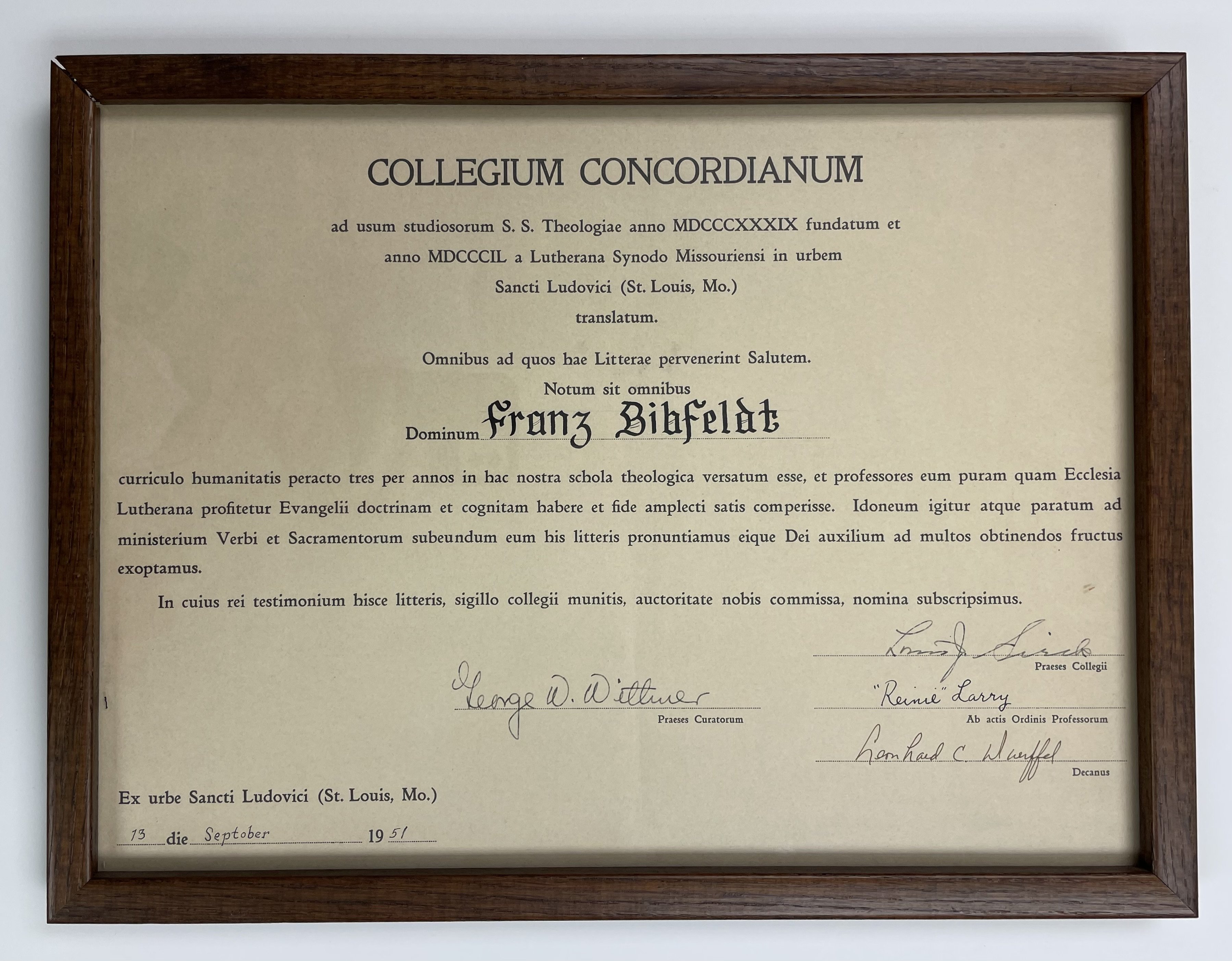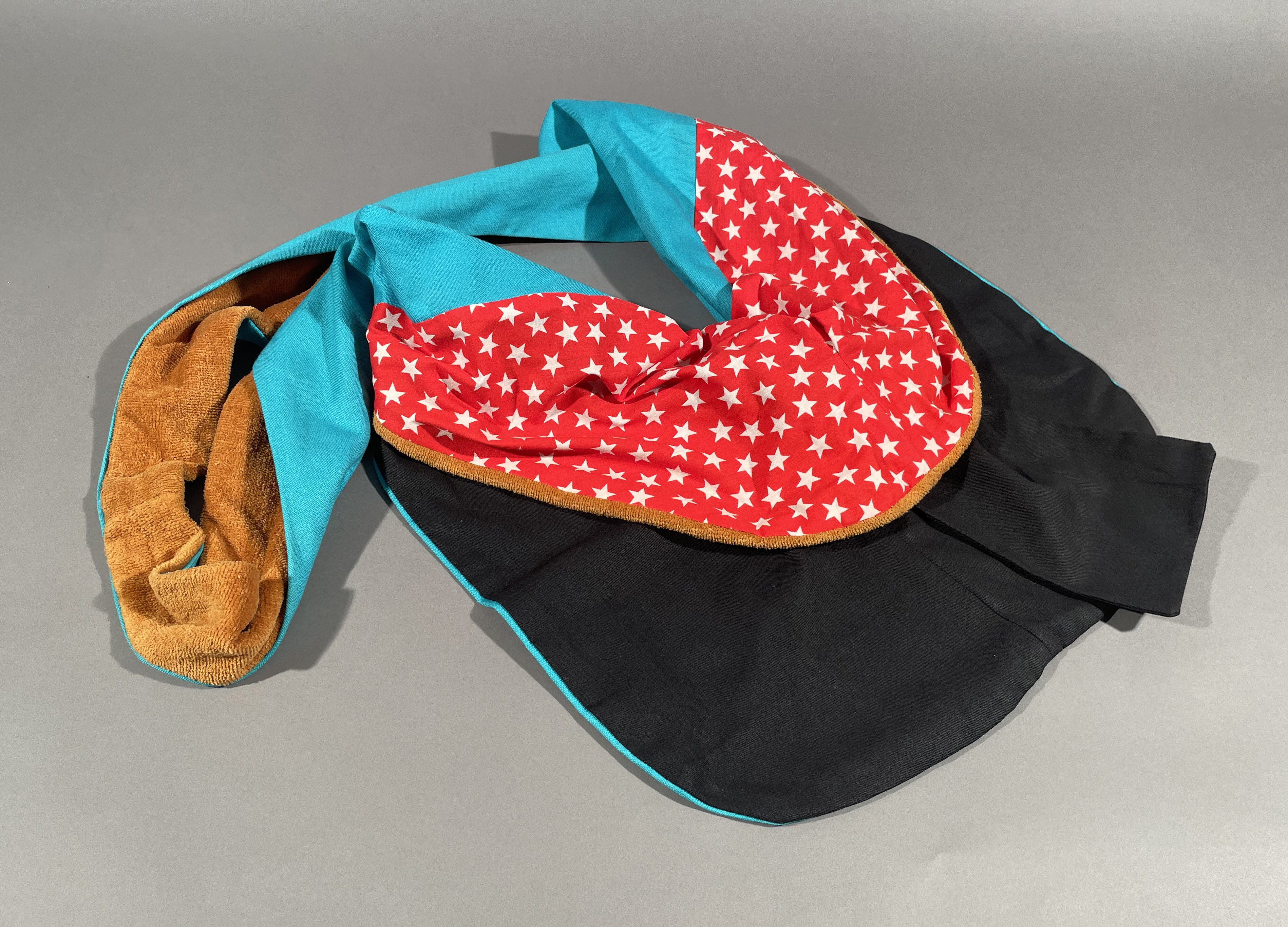Who Is Franz Bibfeldt?
Who isn't he?
"Franz Bibfeldt was born on the early morning hours on November 1, 1897, at Sage-Hast bei Groszenkneten, Oldenberg, Niedersachsen, German, and was baptized later the same day....his is known as the theology of 'Both/And', based on the suggestion that it is possible for the contemporary theologian to be relevant to everything and to adapt to anything....he hated prophecy and in order to avoid it he would change his shape, appearing as a lion, a dragon or even fire. Ordinarily he looked like an old, old man...Bibfeldt's thesis is that the theological should and can reconcile everything to everything. 'If God can do it, why can't we?' he asked." excerpts from Martin E. Marty, "Franz Bibfeldt: Theologian for Our Time," in The Unrelieved Paradox: Studies in the Theology of Franz Bibfeldt, 3.
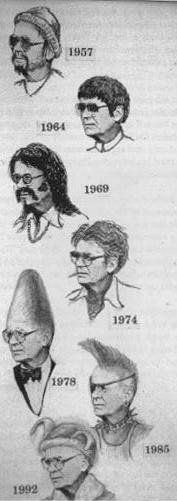
Images of Bibfeldt by David Morgan, The Unrelieved Paradox: Studies in the Theology of Franz Bibfeldt, 161
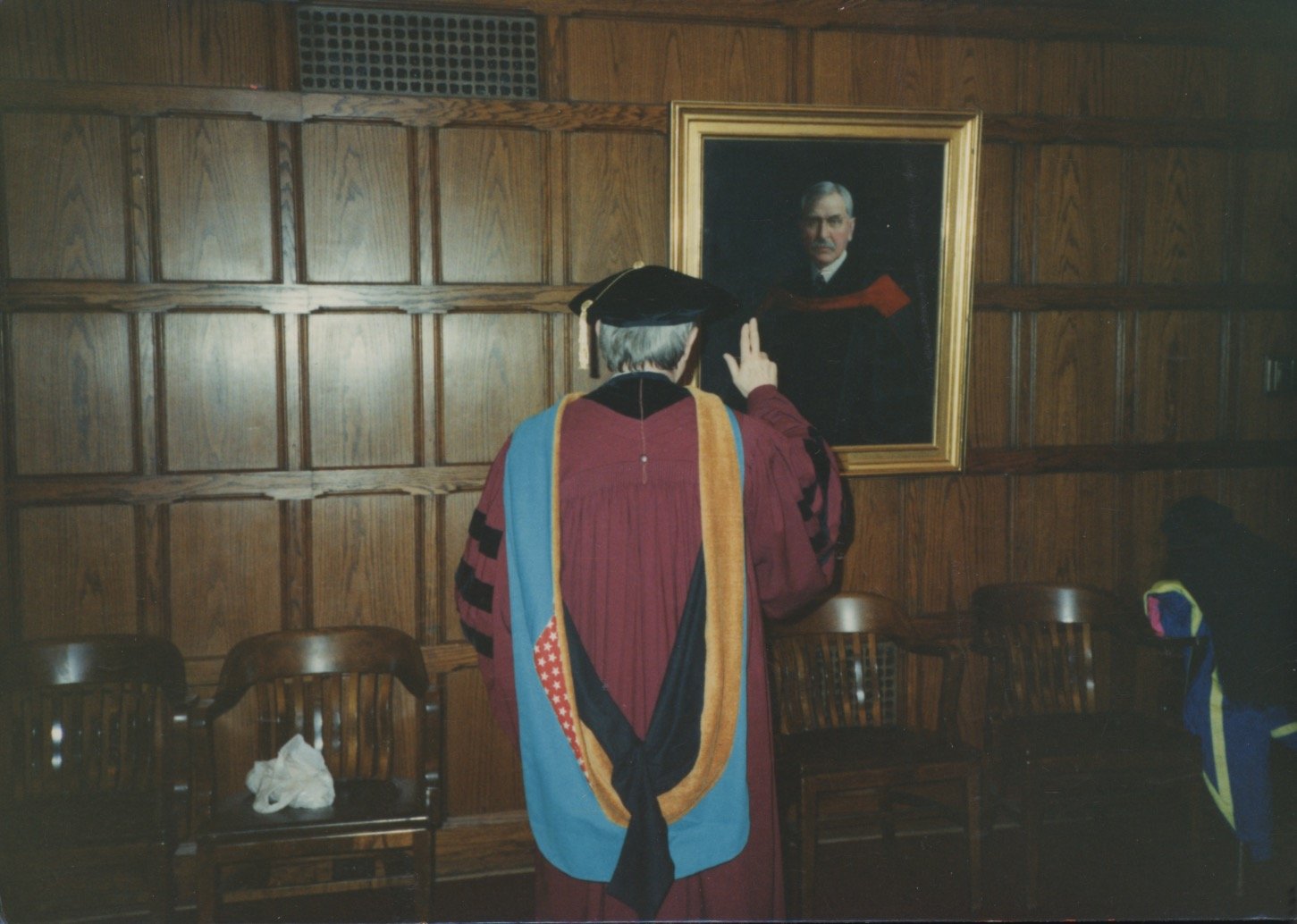
Bibfeldt, Franz. Papers, Box 1, Folder 9, Hanna Holborn Gray Special Collections Research Center, University of Chicago Library.
Franz Bibfeldt at Swift Hall Common Room on the discussion of the University's centennial Autumn convocation. Giving a blessing to the Divinity School's first Dean, Dr. Eli Hulbert. Friday, December 13, 1991.
Bibfeldt himself is characteristically modest — reportedly he has given only one interview, and that to Howard Hughes — but his acts are famous:
- He adapted the Sermon on the Mount for American audiences, writing, “Blessed are the happy who have everything, because they won’t need to be comforted” and “Blessed are the impeccably dressed, because they will look nice when they see God.”
- He responded sharply to Kierkegaard’s Either/Or with a treatise titled Both/And, followed by the conciliatory Either/Or and/or Both/And.
- Other publications include A Pragmatist’s Paraphrase of Selected Sayings of Jesus, The Boys of Sumer: Akkadian Origins of the National Pastime, I Hear What You’re Saying, But I Just Don’t Care: Thoughts on Pastoral Counseling, Luther on Vacation: From Worms to Cancun, and The Wealth of King Solomon: A Hebrew Scripture Prefigurement of Sports Contracts.
- “It is more difficult for a rich man to enter the Kingdom of Heaven than for a camel to pass through the eye of a needle,” he wrote. “Yet, with genetic engineering, we can now breed very small camels.”
Excerpt from "Patron Ain't." Futility Closet, June 7, 2013.
"What, finally, do we know about Bibfeldt the man? The quest ends as it begins. His influence on us is immense, but we seem doomed never to view him whole. Even now, as he begins to receive the scholarly attention he deserves, it is somewhat demoralizing to assess the vast amount of research still to be done. The man who isn't there continues to haunt us and our culture. Our only recourse in the end is to be thankful that he seems to be near us whenever we need him." Dennis L. Landon, "The Man Who Isn't there: Some Notes on the Quest for the Historical Bibfeldt," The Unrelieved Paradox: Studies in the Theology of Franz Bibfeldt, 154.
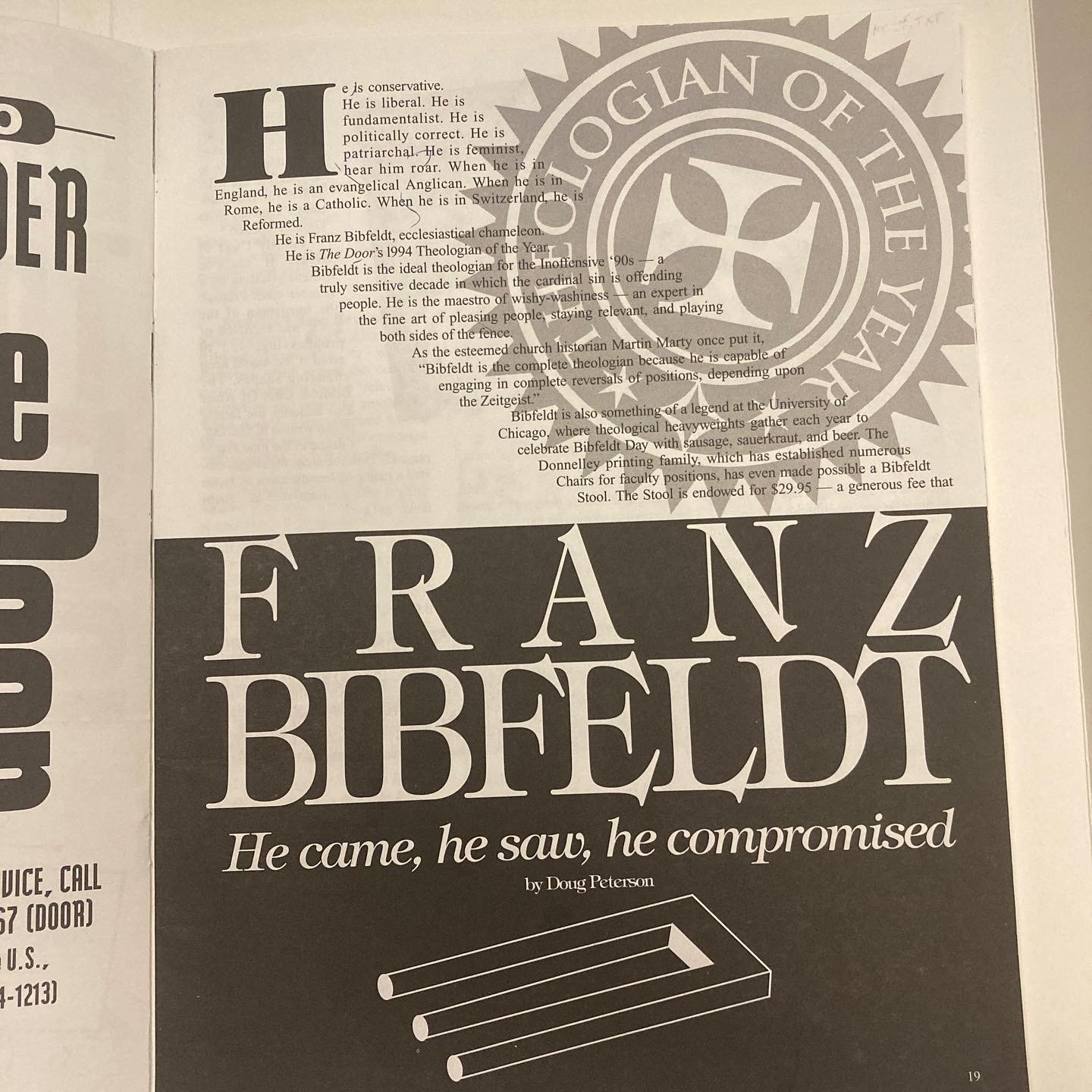
Peterson, Doug, "Franz Bibfeldt: He Came, He Saw, He Compromised," in The Door, September/October, 1993. Bibfeldt, Franz. Papers, Box 4, Folder 2, Hanna Holborn Gray Special Collections Research Center, University of Chicago Library.
Franz Bibfeldt was named "Theologian of the Year" in 1994 by The Door. "He is the maestro of wishy-washiness--an expert in the fine art of pleasing people, staying relevant, and playing both sides of the fence."
Many have expressed surprise that Bibfeldt never worked in academic administration.
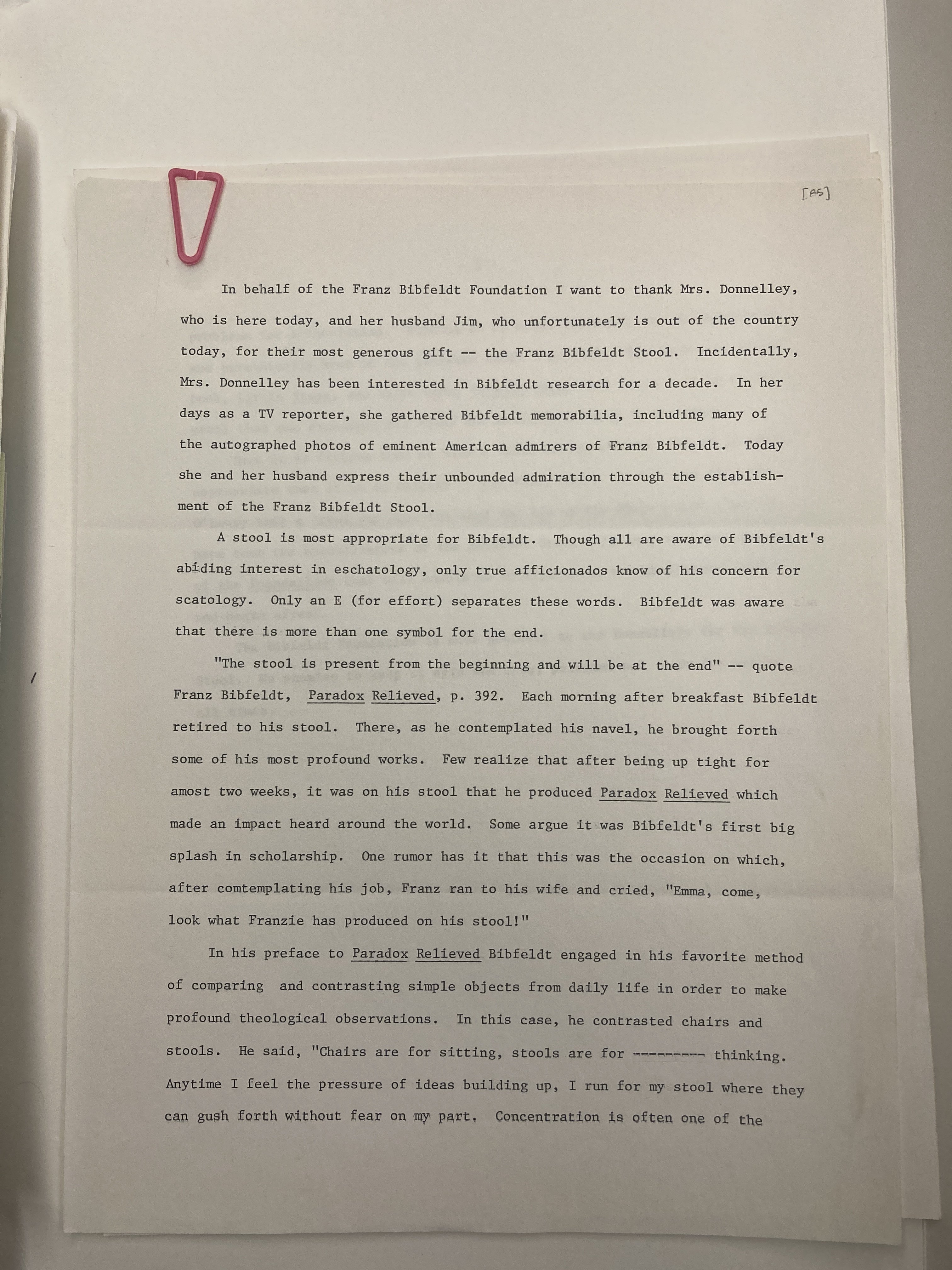
Donnelley Stool of Bibfeldt Studies, J. C. Brauer, Donnelley Stool acceptance speech, correspondence. Bibfeldt, Franz. Papers, Box 2, Folder 6, Hanna Holborn Gray Special Collections Research Center, University of Chicago Library.
"I quote from Bibfeldt's first translated work: "The stool is present from the beginning and will be at the end." A little child sits on a stool. Martin Luther got some of his theological revolutions on a different kind of stool. And when we are old and frail in the legs, as is Franz Bibfeldt, we find that a portable stool comes in handy as we work in the library or attend parties."
A toast to Franz Bibfeldt by Jerald Brauer in celebration of the establishment of the Donnelly Stool of Bibfeldt Studies. "Toasting the Donnelley Stool," The Unrelieved Paradox: Studies in the Theology of Franz Bibfeldt, 214.
"There wasn't nearly enough money to fund an endowed chair, but a thoughtful gift-it's the thought that counts-from University benefactors permitted the establishment of the Donnelley Stool of Bibfeldt Studies: a handsome, three-legged sort of chair. The Foundation proceeds, carefully invested, now produce an annual income of $29.95, which is presented to the person who delivers the annual lecture, as long as he or she can come up with a nickel change." Easton, John "The Unbearable Lightness of Being Bibfeldt," The University of Chicago Magazine, Feb 1995, VOLUME 87, NUMBER 3
Researchers are 99% sure this was not meant as a poop joke. Because, of course, none of this is a joke.
